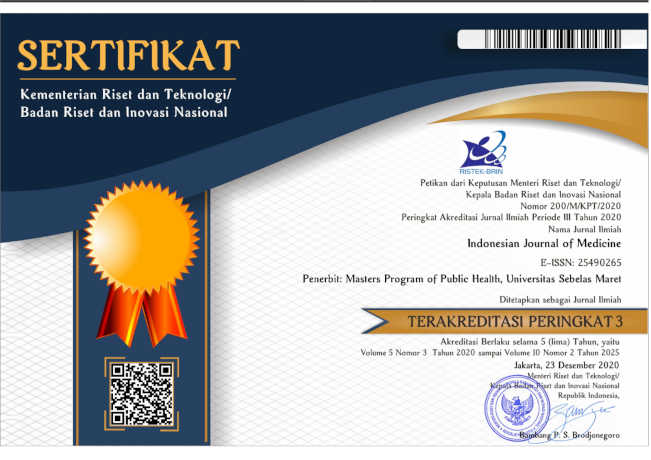Meta-Analysis the Effectiveness of Speech Therapy on Phonation Improvement in People Diagnosed with Parkinsons Disease
DOI:
https://doi.org/10.26911/theijmed.2023.8.3.651Abstract
Background: Parkinson's disease (PD) is a complex, progressive neurodegenerative disease characterized by tremor, rigidity, slow movement, and postural instability. Phonation disturbances are the most frequently observed speech characteristics in PD patients. The purpose of this study was to estimate the effectiveness of speech therapy interventions for phonation improvement in people with a diagnosis of Parkinson's disease.
Subjects and Method: This study is a meta-analysis of a number of Randomized Controlled Trial study designs. The articles used in this study were obtained from several databases including PubMed, Google Scholar, and Springer Link. The article search was carried out by considering the eligibility criteria defined using the PICO model. The population in the study were people with a diagnosis of Parkinson's disease with intervention in the form of speech therapy intervention, comparison, namely no speech therapy intervention, outcome in the form of phonation. The keywords to search for articles are as follows: “Intervention Speech Therapy” OR “Speech Therapy” OR “Phonation” OR “Voice” OR “Parkinson's Disease” AND “Randomized Controlled Trial” OR “RCT”. The articles included in this study are full-text articles with a Randomized Controlled Trial (RCT) study design. Articles are collected using PRISMA flow diagrams. Articles were analyzed using the Review Manager 5.3 application.
Results: A total of 7 articles were reviewed in this study from the United States, North America, and Austria. The total sample size in this study was 213 subjects. A meta-analysis showed that speech therapy was effective for improving phonation in people with a diagnosis of Parkinson's disease (SMD = 2.52; 95% CI = 1.79 to 3.24; p<0.001).
Conclusion: Speech therapy is effective for improving phonation in people with a diagnosis of Parkinson's disease.
Keywords: speech therapy, phonation, voice, parkinson disease.
Correspondence: Anitasari Kartika Putri. Masters Program in Public Health. Universitas Sebelas Maret, Jl. Ir. Sutami 36A, Surakarta 57126, Jawa Tengah, Indonesia. Email: anitaaakartika@gmail.com Mobile: 0857-2777-7217
Indonesian Journal of Medicine (2023), 08(03): 277-285
https://doi.org/10.26911/theijmed.2023.08.03.05
References
American SpeechLanguage Hearing Association (2016). Scope of Practice in SpeechLanguage Pathology. https://www.asha.org/policy/sp201600343/. Diakses Februari 2023.
Choi HS (2011). The Effect of Lee Silverman Voice Treatment (LSVT) on Parkinsonian Phonation: Nonlinear Dynamic, Perturbation, and Perceptual Analysis. Commun Sci Disord. 16(1):335345.
Church FC (2021). Treatment Options for Motor and NonMotor Symptoms of Parkinson’s Disease. Biomolecules. 11(612):117.
Dashtipour K, Tafreshi A, Lee J, Crawley B (2018). Speech disorders in Parkinson's disease: pathophysiology, medical management, and surgical approaches. Neurodegener Dis Manag. 8(5): 337–348.
Fox C, Ramig LO, Sapir S, dan Countryman S (2001). Changes in vocal loudness following intensive voice treatment (LSVT) in individuals with Parkinson’s disease: A comparison with untreated patients and normal age-matched controls. J. Mov. Disord. 16(1): 79–83.
Halpern AE, Ramig LO, Matos EC, Petska JA, Spielman JL, Pogoda JM, Farland DH, et al. (2012). Innovative Technology for the Assisted Delivery of Intensive Voice Treatment (LSVT®LOUD) for Parkinson Disease. Am J Speech Lang Pathol. 21(4): 354367.
Johnson JA, Pring TR (1990). Speech therapy and Parkinson’s disease: A review and further data. IJLCD. 25(2): 183–194.
Kementerian Kesehatan RI (2014). Peraturan Menteri Kesehatan Republik Indonesia Nomor 81 Tahun 2014 tentang Standar Pelayanan Terapi Wicara. Jakarta: Kementerian Kesehatan RI.
Kouli A, Torsney KM, Kuan WL (2018). Parkinson’s Disease: Etiology, Neuropathology, and Pathogenesis. Parkinson’s Disease: Pathogenesis and Clinical Aspects. Brisbane (AU): Codon Publications.
Murti B (2018). Prinsip dan metode riset epidemiologi (5th ed) (Epidemiological research principles and methods). Surakarta: Program Studi Ilmu Kesehatan Masyarakat, Program Pascasarjana, Universitas Sebelas Maret.
O’Brien C, Ramig LO, Countryman S, Hoehn M, Thompson L (1996). Intensive speech treatment for patients with Parkinson’s disease: Short and longterm comparison of two techniques. J. Neurol. 47(6): 1496–1504.
Pu T, Huang M, Kong X, Wang M, Chen X, Feng X, Wei C, et al. (2021). Lee Silverman Voice Treatment to Improve Speech in Parkinson’s Disease: A Systemic Review and MetaAnalysis. Hindawi. 21(1):110.
Ramig LO, Countryman S, Thompson LL, Horii Y (1995). Comparison of Two Forms of Intensive Speech Treatment for Parkinson's Disease. J Speech Lang Hear. 38(6): 12321352.
Saffarian A, Shavaki YA, Shahidi GA, Hadavi S, Jafari Z (2019). Lee Silverman Voice Treatment (LSVT) Mitigates Voice Difficulties in Mild Parkinson’s Disease. MJIRI. 33(5):16.
Sapir S, Ramig LO, Countryman S, Pawlas AA, O'Brien C, Hoehn M, Thompson LL (2001). Intensive voice treatment (LSVT(R)) for patients with Parkinson’s disease: a 2 year follow up. JNNP. 71(4): 493–498.
Spielman J, Ramig LO, Halpern A, Fox C, Freeman K (2018). Speech treatment in Parkinson’s disease: Randomized controlled trial (RCT). J. Mov. Disord. 33(11): 17771791.
Xu H, Bao Z, Liang D, Li M, Wei M, Ge X, Li J, et al (2020). Speech and Language Therapy for Voice Problems in Parkinson’s Disease: A meta-analysis. J Neuropsychiatry Clin Neurosci. 32(4): 344–351.











